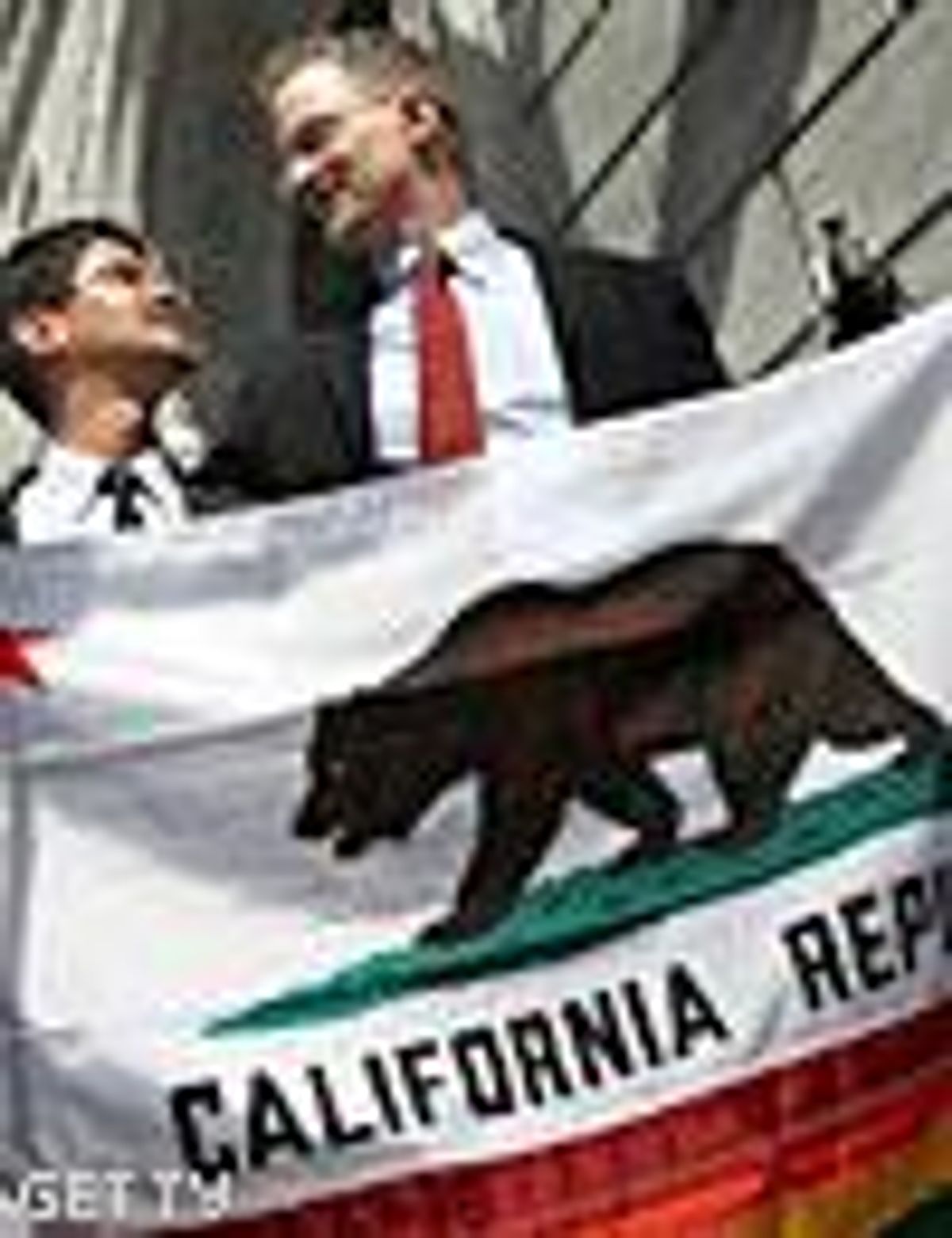The California
supreme court ruling legalizing gay marriage in the state
will not be the last word.
California voters
will almost certainly hold a referendum on a
constitutional amendment banning same-sex marriage in
November, and for the first time anywhere in the
United States, the vote will have a direct and
immediate effect on gay couples waiting to tie the knot.
The amendment
needs a simple majority to pass, and if the voters reject
gay marriage, their decision will supersede the high court's
Thursday ruling that made California the second state
to legalize gay marriage, behind Massachusetts. There
are signs the contest's outcome will be close.
It will certainly
be costly -- the two sides say they plan to spend at
least $25 million combined on the campaign.
''The people who
want to defeat the amendment are going to have to work
very hard to be successful -- harder than the people who
want the amendment to pass,'' said Charles Gossett, a
California State University, Pomona, political
scientist who has analyzed a decade's worth of poll
numbers on the issue. ''But I don't think it's impossible.''
Though the state
has a history of being in the vanguard on gay rights,
California residents have polled slightly against same-sex
rights in recent years.
The most recent
polls, conducted in 2006 and 2007, found that 51% and 49%
of survey respondents opposed making gay marriage legal,
while 43% and 45% endorsed the idea.
Those numbers
have remained virtually unchanged since then-governor Gray
Davis signed legislation in 2003 giving registered domestic
partners the same rights and benefits as married
spouses and since same-sex marriage became legal in
Massachusetts in 2004, according to Gossett. A handful of
other states offer civil unions and domestic partnerships
similar to marriage.
Proponents of the
November initiative think the court's 4-3 ruling will
hit closer to home and galvanize moderate voters who do not
mind gay couples entering into domestic partnerships
but want marriage reserved for a man and a woman.
''You may find
even increased support from 2000,'' when an anti-gay
marriage referendum passed easily, said Andrew Pugno of the
California Marriage Protection Act campaign. ''With
this court decision, the need for the marriage
amendment is brought into clearer focus.''
Mindful of the
defeat suffered by gay marriage opponents in Arizona --
the only state where voters have rejected a marriage
amendment -- the sponsors deliberately decided against
trying to simultaneously repeal domestic-partner
rights, which two thirds of California voters support.
The secretary of
state still must verify the initiative, a decision
expected next month.
Groups from
across the United States already are pledging resources to
defeat or support the measure, similar to gay marriage bans
enacted in 26 other states. Colorado-based Focus on
the Family and the Democratic Congressional Committee
both donated funds during the signature-gathering
phase.
The California
Conference of Catholic Bishops will not take a position on
the measure until it qualifies for the ballot, but ''it is
obviously an issue they will support,'' said
spokeswoman Carol Hogan. The church's position could
be a key factor with Latino voters, who have been
registering in greater numbers, Gossett said. The pope
reiterated his opposition to gay unions on Friday.
Gossett also
noted that survey respondents often give what they consider
to be politically correct answers on social questions such
as gay marriage, but record their true beliefs at the
ballot box. A month before 61% of California voters
approved the 2000 marriage ban, only 52% of likely
voters told pollsters they favored the proposition.
Corey Cook, a
political scientist at the University of San Francisco,
said other demographic and political changes will be in play
during a presidential election that has attracted the
interest of younger voters who tend to be much more
accepting of gay relationships.
''We have a
different electorate than we did eight years ago. They're
more inclined to vote against the constitutional
amendment,'' Cook said.
Perhaps more
important, Californians this time might have witnessed
hundreds of gay marriages by November. Opponents of gay
marriage will ask the high court to stay Thursday's
decision, but the court is not obligated to do so.
If gay marriages
become a reality this summer, Cook said, voters will be
faced with the choice of disappointing their neighbors and
relatives. Some think that will only happen in San
Francisco, but Cook disagreed.
''People who live
in Fresno are going to know gay people who are going to
be married,'' he said. (Lisa Leff, AP)


















































































